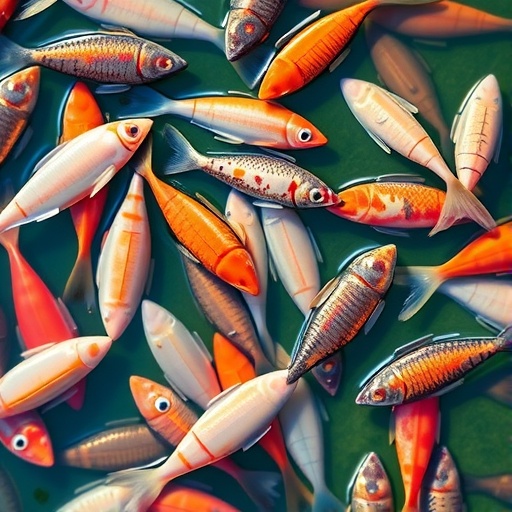A comprehensive policy report published jointly by the German National Academy of Sciences Leopoldina and the Brazilian Academy of Sciences (Academia Brasileira de Ciências, ABC) delves into the practical dimensions of establishing sustainable and circular aquaculture systems in Germany and Brazil. Both countries possess abundant, yet largely underexploited, freshwater aquaculture potential. Despite the geographic and climatic conditions conducive to aquaculture expansion, the current levels of domestic fish production fall short of meeting national consumption demands, leading to reliance on imports and missed opportunities for local economic development and environmental resilience.
The report reveals that annual per capita fish consumption in both Brazil and Germany remains markedly below the global average of 20.5 kilograms. With Brazil averaging roughly 10 kilograms and Germany about 14 kilograms per capita, these numbers signal untapped market potential that could be addressed through strategic expansion and optimization of freshwater aquaculture. Notably, Germany’s aquaculture sector is experiencing a contraction, rooted in regulatory complexities and insufficient domestic production capacities. Only around two percent of finfish consumed in Germany originate from local aquaculture, underscoring the urgency of revitalizing this sector.
.adsslot_lp0WFnAoq5{ width:728px !important; height:90px !important; }
@media (max-width:1199px) { .adsslot_lp0WFnAoq5{ width:468px !important; height:60px !important; } }
@media (max-width:767px) { .adsslot_lp0WFnAoq5{ width:320px !important; height:50px !important; } }
ADVERTISEMENT
Achieving sustainable aquaculture growth demands addressing systemic barriers embedded in policy frameworks and regulatory landscapes. Streamlining approval processes and clarifying institutional responsibilities are identified as critical steps to accelerate project initiation and implementation. The report suggests appointing specialized “Aquaculture Officers” within regulatory bodies as a means to harmonize decision-making, bridge gaps between agencies, and enhance efficiency. Simplifying bureaucratic hurdles would not only reduce lead times but also signal institutional commitment to supporting sustainable aquaculture development.
Equally paramount is the cultivation of a skilled workforce equipped to design, manage, and innovate within sustainable production systems. The report highlights the necessity for targeted educational initiatives encompassing both foundational and advanced aquaculture training programs. Establishing degree courses and continuing education modules at university levels would foster a new generation of scientists, technicians, and entrepreneurs proficient in cutting-edge aquaculture technologies and ecological management practices. Professional development aligned with sustainability principles is essential to meet evolving challenges in disease management, feed optimization, and waste recycling.
The environmental dimension of sustainable freshwater aquaculture encompasses maintaining water quality, conserving biodiversity, and mitigating pollution risks. Freshwater systems often face pressures from nutrient loading, sedimentation, and chemical runoff associated with poorly managed fish farming operations. Circular aquaculture frameworks aim to close nutrient loops by recovering and repurposing waste products as inputs for aquaponics, agriculture, or bioenergy generation, thereby reducing external resource dependencies and limiting detrimental ecosystem impacts. These ecological benefits align with broader commitments to climate action and ecosystem restoration targets under global sustainability agendas.
The collaboration between German and Brazilian scientific communities encapsulates an interdisciplinary, cross-continental effort to harmonize knowledge and practices for resilient aquaculture food systems. The report’s development was rooted in the October 2023 workshop “Sustainable Aquaculture – Environmental Impacts and Food Security,” hosted by the Leibniz Institute of Freshwater Ecology and Inland Fisheries in Berlin. This forum facilitated rigorous exchanges among early-career scientists from both regions, fostering a nuanced understanding of the challenges and opportunities inherent to freshwater aquaculture across vastly diverse geographic and socio-economic contexts.
Policy recommendations laid out in the report emphasize integrating aquaculture into national food security strategies, acknowledging its multifaceted contributions to nutrition, rural livelihoods, and environmental stewardship. Holistic governance approaches that balance production intensification with ecosystem integrity are advocated to ensure aquaculture’s long-term sustainability. This includes strengthening research funding, encouraging innovation ecosystems, and fostering inclusive stakeholder participation that bridges governmental bodies, industry players, and local communities.
Moreover, the report underscores the importance of monitoring and evaluation frameworks to track aquaculture’s environmental, economic, and social impacts. Establishing robust data collection, impact assessment protocols, and adaptive management strategies will enable dynamic responses to emerging risks and enhance the sector’s resilience amid climate variability and market fluctuations. Evidence-based policymaking grounded in transparent performance metrics is instrumental in building public trust and attracting sustainable investment capital.
In summary, freshwater aquaculture stands at a pivotal juncture where strategic investment, regulatory reform, and knowledge integration can unlock its vast potential as a sustainable protein source. By leveraging the complementarities between scientific innovation and policy action, both Germany and Brazil have the opportunity to carve leadership roles in pioneering circular aquaculture models that are ecologically sound and economically robust. The joint policy report represents a clarion call to harness this potential, ensuring aquaculture’s positive contributions to resilient global food systems and planetary health.
Subject of Research: Sustainable freshwater aquaculture and its role in global food security and environmental sustainability.
Article Title: Advancing Sustainability and Circularity in Freshwater Aquaculture: Insights from Germany and Brazil
News Publication Date: (Not provided)
Web References: (Not provided)
References: (Not provided)
Image Credits: (Not provided)
Keywords: Aquaculture, Fisheries, Sustainable agriculture, Agriculture, Applied sciences and engineering
Tags: biodiversity conservation in aquaculturecircular aquaculture systemseconomic development through aquacultureenvironmental impacts of aquaculturefish consumption in Germany and Brazilfreshwater aquaculture potentialglobal food systems and aquaculturepolicy recommendations for aquacultureresource efficiency in fish productionseafood demand and supplystrategies for sustainable food securitysustainable aquaculture practices





